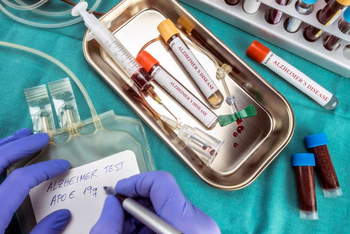Alcohol May Speed Alzheimer’s Progress in the Brain
Health conditions are seen as a natural part of the aging process, but that isn’t to say there aren’t lifestyle choices people can make to improve and preserve their health. A recent report highlights the connection between alcohol and Alzheimer’s, providing another argument for why people should not consume alcohol, even “in moderation.”

Alcohol and Alzheimer’s
“Even modest drinking can speed up the loss of brain cells and formation of the plaques that are a hallmark of Alzheimer’s disease, research in mice shows.” That is the subheading of a breaking news report that announced new scientific research into the connection between alcohol and Alzheimer’s. About 60 to 80% of dementia cases occur in patients already struggling with Alzheimer’s disease, suggesting Americans could prevent two of the most saddening old age-related illnesses (Alzheimer’s and dementia) simply by drinking less.1
According to research published by a group of scientists at Wake Forest University School of Medicine in Winston-Salem, NC, alcohol consumption leads to the accumulation of toxic proteins in the brain over time, leading to plaque build-up and brain cell loss. Study co-author Dr. Shannon Macauley, associate professor of physiology and pharmacology, spoke to this point. “These findings suggest alcohol might accelerate the pathological cascade of Alzheimer’s disease in its early stages.” The findings are the first of their kind that draw a cause-and-effect connection between alcohol consumption and Alzheimer’s.2

The researchers found that an increase in alcohol consumption—both in terms of frequency of consumption and volume of consumption—was associated with increased brain atrophy (a loss of brain cells) and an increase in plaque build-up in the brain. Increased plaque proliferation and brain cell loss are early predictors of Alzheimer’s and dementia.
Alcohol consumption was not just connected to Alzheimer’s and dementia, the researchers highlighted. In their findings, the researchers noted that any alcohol consumption (even moderate drinking) elevated blood sugar and increased the risk of type 2 diabetes, heart disease, and vascular disease.
The researchers also noted a connection between alcohol consumption and anxiety, which they said is also a predictor for dementia. Again quoting Macauley, “These preclinical findings suggest that even moderate consumption of alcohol can result in brain injury. Alcohol consumption may be a modifiable risk factor for Alzheimer’s disease and dementia.” The takeaway? Drink less.
What are Some of the Other Negative Health Effects Associated with Alcohol?
The research cited above was the most recent in an ever-growing trove of scientific data that connects alcohol consumption to long-term harm to the human body and mind. Entire textbooks could be written on the subject, but a summarized analysis of how alcohol affects the body has been briefly sketched out below:3
- The brain. In addition to increasing risks for brain-related diseases (like Alzheimer’s), alcohol consumption interferes with the brain’s communication pathways, affecting how the brain looks and works. Such disruptions can change mood and behavior, making it more difficult to think clearly and move with coordination.
- The heart. Alcohol consumption can harm the heart. When consumed over time, alcohol can lead to several heart health conditions and emergencies like cardiomyopathy, arrhythmias, stroke, and high blood pressure.
- The liver. The liver is responsible for processing the toxins in alcohol, so the liver is often the organ first (and most) affected by regular drinking. Alcohol consumption can lead to cirrhosis—which can be fatal—and steatosis, fibrosis, and alcoholic hepatitis.
- The pancreas. Drinking alcohol can cause the pancreas to produce toxic substances, leading to pancreatitis, a dangerous, potentially life-threatening inflammation and swelling of the blood vessels in the pancreas that prevents proper digestion and potentially leads to serious health problems.

- Alcohol and cancer. Concerningly, alcohol has now been identified as a predictor for several cancers. Quoting the National Cancer Institute, “The evidence indicates that the more alcohol a person drinks—particularly the more alcohol a person drinks regularly over time—the higher his or her risk of developing an alcohol-associated cancer. Even those who have no more than one drink per day and people who binge drink (those who consume 4 or more drinks for women and 5 or more drinks for men in one sitting) have a modestly increased risk of some cancers. Based on data from 2009, an estimated 3.5% of cancer deaths in the United States (about 19,500 deaths) were alcohol related.” The National Cancer Institute goes on to identify head cancer, neck cancer, esophageal cancer, liver cancer, breast cancer, and colorectal cancer as being just a handful of cancers directly connected to alcohol consumption.
- Alcohol and the immune system. Research also shows that alcohol consumption harms the body’s immune system, mainly that it inhibits the immune system from functioning properly. Drinking over time can permanently subdue the body’s immune response. And even drinking alcohol to excess on just one occasion can slow the body’s ability to ward off infections for up to 24 hours after getting drunk.
No Amount of Alcohol Consumption is Safe or Healthy
The obvious conclusion that one should draw from the above findings is that the old notion of “moderate alcohol consumption is not harmful to one’s health” is false. One should abstain from drinking to preserve one’s health in their youth, adulthood, and old age.
Those who drink alcohol and cannot stop should immediately seek professional help at a qualified residential treatment facility. If you know someone who cannot control their drinking, please help them find and enter treatment today.
Sources Cited:
-
USNews. “Alcohol Might Speed Alzheimer’s Progress in Brain, Animal Study Suggests.” U.S. News, 2023. usnews.com ↩︎
-
ScienceDirect. “Ethanol exposure alters Alzheimer’s-related pathology, behavior, and metabolism in APP/PS1 mice.” Science Direct, 2023. sciencedirect.com ↩︎
-
NIAAA. “Alcohol’s Effect on the Body.” National Institute on Alcohol Abuse and Alcoholism, 2023. niaaa.nih.gov ↩︎






 ®
®